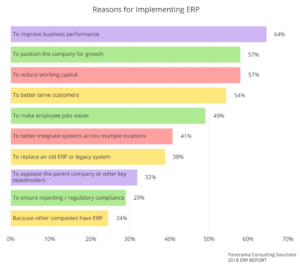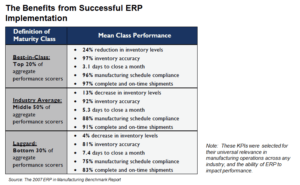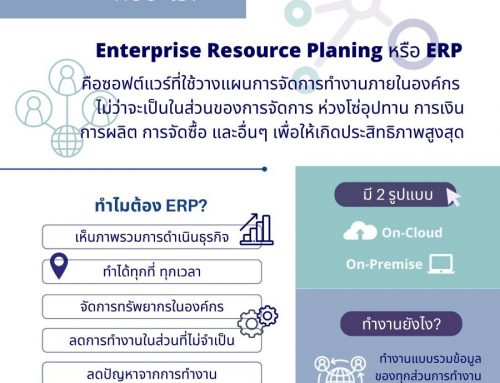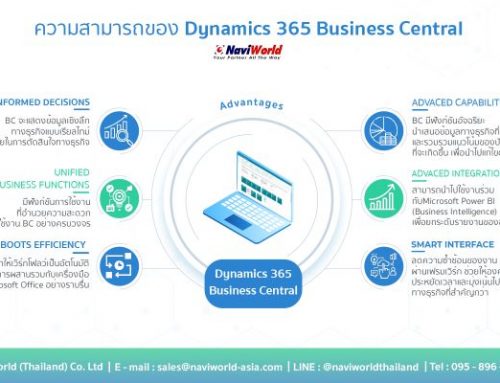Benefits of ERP – Singapore Stories
Introduction
There are many articles written about the benefits of Enterprise Resource Planning (ERP) over the years. A report on CIO ASEAN on 23 February 2019 about “What is ERP? Key features of top enterprise resource planning systems” provided a clear understanding and benefits of ERP.
In Singapore, when you mentioned about ERP, people will instinctively be mistaken that you are referring to “Electronics Road Pricing.” And, they may think that you probably work with the Land Transport Authority (LTA) of Singapore.
This article takes the view of how Enterprise Resource Planning (ERP) affects our Singapore companies. And how it applies to the unique Singapore business environment.
We study the benefits of ERP (Enterprise Resource Planning), and how it helps to build our Singapore Stories.
Top Business Challenges and Implications for Singapore Companies
In the last 20 years, the rapidly changing business environment had affected the bottom-line and survival of Singapore companies.
If you started a business 30 years ago, you could win sales if you were able to deliver the quality needed. Our labour cost was low, and the pace of business was much slower. You enjoyed a higher margin and probably made your first pot of gold. As time goes by, you will discover that margin is diminishing. You work much harder now just to get a small margin that you used to enjoy 20 years ago.
1. Competition from Foreign Distributor/Manufacturers/Retailers
Gone were the days when your competitor was someone down at the other end of the road. Even if your business is only serving the local market, you cannot escape competitions from outside Singapore.
More than 20 years ago, I was working in a Singapore precision engineering company. We had to compete with rivals from Hong Kong and China. These competitors received orders from Singapore customers, manufactured their products in China, matched our quality at lower prices.
Today, if you are a retailer, besides competing against local competitors, you also compete against China retail giants Taobao.
Lower cost materials from overseas provide competitive advantages to our Singapore companies. However, this also pose serious challenges as our competitors.
So, the power to achieve cost and speed advantages is crucial. Realising the benefits of ERP is vital to fulfilling our Singapore stories.
2. Dependency on World Economies/Consumer Spending
When the world sneezes, we in Singapore will be affected. The world is now more interconnected and interdependent. To be able to analyse and react quickly are keys.
3. Volatile Raw Material and Energy costs
The volatility of raw material and energy price is making it challenging to perform long term planning.
The ability to react quickly will depend on timely information such as inventory level, costs, and orders on hand. More information is readily available, and faster management can take action.
4. Regulations and Export Risks
Countries are becoming more regulated. Regulations are getting more sophisticated. The ability to generate accurate documents and provide accurate information will minimise errors and speed up business processes. These are the strengths of a proper ERP implementation.
5. Capital Investment
As the country moves away from low cost and labour-intensive industries, high capital investment for businesses will increase the risk for returns. A good investment in ERP will help to improve the ROI of the company.
6. Extended Supply Chains
Most of Singapore companies probably purchase or even sell outside of Singapore. For some businesses, local delivery to customers will be a daily challenge. The supply chain is getting more complex to manage as customers heighten their expectations.
7. Lack of Labor with Increasing Cost
Labour cost in Singapore has been increasing annually. But, the rental fee is not dropping despite the slowing economy. Hence, the strategy of relying on low cost is limited. The need to streamline business processes and to maximise your limited labour and space are keys for business success.
ERP can help to cut down manual paperwork. It facilitates inventory planning, reduces stock while maintaining customer services.
8. Speed of Change is Accelerating
When the world is more inter-linked, changes in one region will have a ripple effect across the globe. As one of the most open economies in the world, Singapore companies cannot afford to take years to implement an extensive ERP system. Furthermore, companies should avoid ERPs that are very rigid.
Benefits of ERP for Singapore Companies
When we talk about the benefits of ERP, we must understand it within our Singapore stories. Singapore companies are mostly SMEs. Even our more substantial companies are often considered as mid-sized companies in other larger countries. So, in ERP terms, there are very few Enterprise Level Large Corporations in Singapore.
There are many studies on the traditional benefits of ERP.
Medium.com article on “30 Ways to Transform Your Company with ERP Business Software” utilised the Panorama Consulting Solutions 2018 ERP Report. It illustrates the reasons for companies implementing ERP:
I will attempt to look at the benefits of ERP from the angle of how it is relevant to our Singapore Success Stories. When possible, I will share some of the real Singapore case stories to illustrate my points further.
1. Enable Management Beyond the Line-of-Sight
Not all companies need ERP. If the company managers can control and obtain the status of work visually in one room, then the benefits of ERP may not be important to them. But most of the companies had probably grown beyond this stage. So, systems such as ERP will help management to manage beyond the Line-of-Sight.
Control
More than 20 years ago, I was working in a local manufacturing company. The boss used to make more than SGD 100K of net profit a year when the revenue was SGD 1M. Years later, when revenue grew to above SGD 10M. But, guess what, the net profit was still SGD 100K.
The owners of that company were very hands-on people. They started the company through proper control of the cost, personally getting the sales, adequate supervision of the manufacturing process, and even doing the delivery themselves. They were quick to know if there were issues and able to solve the problem quickly.
As the company grew, middle managers were needed. Their advantage of having line-of-sight control became challenging.
“More revenue means more activity. More activity does not necessarily translate to more profit.”
ERP can bring about better control such as purchase and sales approval, tracking of the progress, and ensuring credit control.
Inventory and Selling
One of our distribution and retail customers used to have an ERP system for more than seven years. But for some reason, their warehouse personnel had no access to the system. Their office printed on picklist on paper and sent to their warehouse. The warehouse personnel passed the same paper back to the office to update the ERP the next day.
The Issues
The status of the stock balance and shipment was at least one day behind. So, what were the problems:
- As salespersons had no visibility of the stock balance, they reserved as many stocks as possible for their pending sales orders. This behaviour created internal conflicts among the salespersons.
- Missing inventory transactions and the system was not updated. These errors resulted in a very high stock discrepancy during the year-end stock-take.
- Before the warehouse personnel can fully stuff the containers for export, they often had to ship the not fully stuff freight containers out due to the lack of time.
The Solution
We upgraded and re-implemented their ERP system. The warehouse personnel now have access to the ERP through mobility terminals. The stock movement is updated as they occur.
Below are the benefits that they obtained one year after the implementation:
- The customer was about to complete their annual stock-take within regular working hours. In previous years, the stock-take team often had to work until midnight.
- The stock discrepancy was nearly zero.
- Order fulfilment improves from 70% to 90%.
- Export Containers able to stuff up to 90% instead of the previous 70%.
- Stock level reduced even when revenue increased.
The customer achieved break-even of their project in less than one year. The project improved their sales, lower their stock, which ultimately enhances their bottom-line.
2. Integrated Business Processes
One thing that ERP does very well is integrating long business processes to finance. This integration is a unique critical advantage of ERP. No other software solution can match.
However, I am not recommending that all your business processes should be in one ERP system. Some of the functionalities, such as payroll, are often better to do in separate software for data privacy reasons.
The integration of business processes brings about the following benefits of ERP:
Speed in Execution
In an ERP system, users work in an integrated manner. If someone upstream forgets to execute a process, users in the downstream noticed it. They will take action. Users can check for status, perform a large volume of processes with minimum errors.
Facilitate Data Collection
The biggest challenge in data collection is to ensure that users enter the data into systems. CRM (Customer Relationship Management) Projects became redundant after implementation. Users either did not update the information or hide information from the management. This is because these users could continue to do their job, even if they did not update data into the system.
In ERP Systems, such behaviour of not updating data on-time will be improbable. If the user did not create Sales Order, the order could not be shipped. If the stock is not updated, shipping cannot be executed. So, the use of ERP becomes a daily working habit. And it is through these daily works of using ERP, that rich information can be collected for better decision making.
Financial Closing
As all the operations information is merged into the finance, monthly and yearly closing can complete faster. Management will have updated information for their analysis and decision making.
Management can access timely business information anytime.
One of our customers in the retail industry was running POS (Point-of-Sales) in their retail outlets. Due to poor implementation, they did not integrate POS to their back-office accounting system. Their IT person had to use a reporting tool to remote into each POS to extract data, then made it into a management report. We upgraded and re-implemented their ERP with integration to POS, e-Commerce, and a customer app. The project helped them to achieve the following benefits:
- Previously, the retail outlets took an average of 1.5 hours each evening to close their POS. They had to account for the collection and print reports to reconcile. Now, they take less than 10 minutes to do the POS closing. This improvement saves them an extra 1 hour each day to open for sales.
- Now, they can see the hourly sales performance of each retail outlet from their HQ.
- Inventory movement and balance are integrated from the warehouse, retail outlets, and e-commerce. Without this integration, it will be impossible for them to implement e-Commerce.
- Finance eliminated manual work. Information flow to the finance and traceability was enhanced. Month-end closing is now a much easier task.
3. The Backbone for Business Strategy
Some people advocate that ERPs are old technology. That forward-looking company should focus on selling online, AI, etc.
But even if you have great e-Commerce sites that bring in millions of sales, how are you going to deliver them. Managing finance when the transaction increased will be a nightmare.
e-Commerce
ERP is the backbone to fulfil orders coming from e-Commerce sites. Integration between e-Commerce and ERP should be online instead of using the old ineffective method. This method of integration is preferred because validation can be built into Web Services for online integration. It will help to reduce errors in data passing throughout the various systems.
Stock balance from the warehouse and order status can be updated to the e-Commerce site to improve the customer experience.
Route Planning
ERP can integrate with various supporting systems such as route planning solution. One of our customers integrated their ERP to route planning, such as Elastic Route. This integration made its delivery more efficient.
AI and Analytics
We worked with several data scientists to help our customers to leverage the data in their ERP.
Sales, invemtory and cash-flow Forecasts base on the quantitative data in the ERP can use AI and Analytics. User input of qualitative data can complement the forecast generated by AI and Analytics.
One of our e-Commerce customers implemented an ERP with integration to four e-Commerce Sites.
Previously they handled their inventory by customising their e-Commerce site. As the business grew, it became challenging to manage the costing information. Finance reporting was both tedious and inaccurate.
They faced difficulty settling the payments with sales. There was confusion with the delivery when orders were changed by customers. Managing a refund and updating the changes to sales orders used to be very tedious.
With the implementation of the ERP and mobility terminals at their warehouse, handling goods receive, shipment, inventory balance became transparent. Their stock balance is integrated online, and their potential customers have visibility of product availability and delivery status. Business flow is integrated to finance, making the management reporting much more accessible.
The benefits that they obtained from the project help them to achieve another successful Singapore story by reducing 20% of their labour cost just three months after their ERP project went live.
4. Efficiency
Achieving efficiency has been the traditional benefits of ERP. Singapore government has been encouraging our Singapore companies to implement ERP for more than 20 years. Incentives and support, such as government grants, have been helping companies to achieve successful Singapore stories.
Do More with Less
With higher labour costs and scarcity of quality employees, ERP helps companies to achieve more with less labour. As the system integrates all major business processes, it eliminates duplicate data entries. This integration has the added advantage of reduced data error.
Facilitate Management Decision Making
With the advancement in AI and Analytics, ERP facilitates companies in making better and faster decisions.
Management by Objectives and Management by Exception can be executed through ERP. This method helps company management focus on issues that are key to their success.
Working Capital
The impact of efficient usage of working capital is critical when businesses need higher capital investment. Inefficient use of working capital will often result in cash flow problems. So, how do ERP benefits companies in terms of working capital?
Reduce Inventory
There are numerous studies on the benefits of ERP on inventory. From the result of one of the studies below, you can see that a well-implemented ERP system can help the company to reduce an average of 24% of the stockpile. Cash that was previously tied up in-stock can be released.
Improve Account Receivable Ageing
For companies tracking their accounts receivable, it is common that invoices were delayed or missed. An ERP system will ensure that invoicing and collections are done timely if it is applied right.
5. Bond the Team
Most will agree that people are the key to achieving successful Singapore stories. Sadly, very few realised the positive impact of a proper ERP implementation on people.
From my 20 years of ERP experience, I had seen people resigned during ERP implementation. They often either did not agree about the project or refused to change. At the same time, I had met many company employees who enjoy the benefits of a proper ERP implementation.
I realised that when companies work with mostly manual processes, employees in the company tend to be self-centered. This is because when information is not clear, they avoid being blamed for mistakes.
A few years ago, I spoke to a business partner on our customer servicing experience. During our chat, he shared that his customers used to be tough to handle. They were very defensive. However, after the successful implementation of the ERP, there seems to be better planning between departments. He found that it was more comfortable to work with their employees, and they had become more open.
So, proper ERP implementation will often reduce stress and promote better team bonding.
Conclusions
All the benefits of ERP aim to bring about better company performance. But the result will only be achieved if it is well implemented.
There is no doubt that ERP will bring benefits to companies to achieve their successful Singapore stories.
The vast options of established ERP solutions in Singapore, such as Microsoft Dynamics 365 Business Central and SAP Business One, are making it easy for companies to select and implement suitable ERP.
If the choice is too much, you may like to read our article on “How to Select ERP for SME“. Or you can read “Cloud ERP or On-Premise ERP – What you Need to Know” for more information.
You may also like to read our article on “10 Keys to Successful ERP Implementation” for some advice about ERP implementation.









